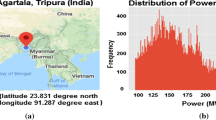Abstract
An accurate residential load forecast benefits a consumer domain energy management system extensively, as it provides minimum threshold energy to the consumers instead of completely shedding supply by the electricity distribution companies. In this paper, a model is proposed using the extreme gradient boosting ensemble algorithm for forecasting of residential loads. The publicly available UCI dataset is utilized, which is based on the real-life electric power consumption of a residence in France. Lag-based features capturing power consumption for different periods are added to the dataset. Correlation analysis of the features is done to filter the redundancy of features. The dataset was resampled for different time resolutions and used it for forecasting the power consumption of the residence for a day and a week ahead. The results from experimentation strongly indicate that the proposed model outperforms the existing machine learning models as to the accuracy of forecast and computational time.
Access this chapter
Tax calculation will be finalised at checkout
Purchases are for personal use only
Similar content being viewed by others
References
Marcincin, O., Medvec, Z., Moldrik, P.: The impact of electric vehicles on distribution network. In: 2017 18th International Scientific Conference on Electric Power Engineering (EPE), Kouty nad Desnou, 2017, pp. 1–5, doi: https://doi.org/10.1109/EPE.2017.7967344
Senjyu, T., Takara, H., Uezato, K., Funabashi, T., Member, S. : One-Hour-Ahead Load Forecasting Using Neural Network (2002)
Yu, C.N., Mirowski, P., Ho, T.K.: A sparse coding approach to household electricity demand forecasting in smart grids. IEEE Trans. Smart Grid 8(2), 738–748 (2017). https://doi.org/10.1109/TSG.2015.2513900
Rashed Mohassel, R., Fung, A., Mohammadi, F., Raahemifar, K.: A survey on advanced metering infrastructure. Int. J. Electr. Power Energy Syst. 63, 473–484 (2014). doi: https://doi.org/10.1016/j.ijepes.2014.06.025
Wu, D., Wang, B., Precup, D., Boulet, B.: Multiple Kernel learning-based transfer regression for electric load forecasting. IEEE Trans. Smart Grid 11(2), 1183–1192 (2020). https://doi.org/10.1109/TSG.2019.2933413
Bin Song, K., Baek, Y.S., Hong, D.H., Jang, G.: Short-term load forecasting for the holidays using fuzzy linear regression method. IEEE Trans. Power Syst. 20(1), 96–101 (2005). doi: https://doi.org/10.1109/TPWRS.2004.835632
Jiang, H., Zhang, Y., Muljadi, E., Zhang, J.J., Gao, D.W.: A short-term and high-resolution distribution system load forecasting approach using support vector regression with hybrid parameters optimization. IEEE Trans. Smart Grid 9(4), 3331–3350 (2018). https://doi.org/10.1109/TSG.2016.2628061
Lopez, J.C., Rider, M.J., Wu, Q.: Parsimonious short-term load forecasting for optimal operation planning of electrical distribution systems. IEEE Trans. Power Syst. 34(2), 1427–1437 (2019). https://doi.org/10.1109/TPWRS.2018.2872388
Rejc, M., Pantoš, M.: Short-term transmission-loss forecast for the Slovenian transmission power system based on a fuzzy-logic decision approach. IEEE Trans. Power Syst. 26(3), 1511–1521 (2011). https://doi.org/10.1109/TPWRS.2010.2096829
Lachut, D., Banerjee, N., Rollins, S.: Predictability of energy use in homes. In: International Green Computing Conference, Dallas, TX, 2014, pp. 1–10. doi: https://doi.org/10.1109/IGCC.2014.7039146
Zhang, Y., Chen, W., Xu, R., Black, J.: A cluster-based method for calculating baselines for residential loads. IEEE Trans. Smart Grid 7(5), 2368–2377 (2016). https://doi.org/10.1109/TSG.2015.2463755
Goodfellow, I., Bengio, Y., Courville, A.: Deep Learning. MIT Press (2016)
Dong, X., Qian, L., Huang, L.: A CNN based bagging learning approach to short-term load forecasting in smart grid. In: 2017 IEEE SmartWorld, Ubiquitous Intelligence & Computing, Advanced & Trusted Computed, Scalable Computing & Communications, Cloud & Big Data Computing, Internet of People and Smart City Innovation (SmartWorld/SCALCOM/UIC/ATC/CBDCom/IOP/SCI), San Francisco, CA, 2017, pp. 1–6, doi: 10.1109/UIC-ATC.2017.8397649
Kim, N., Kim, M., Choi, J.K.: LSTM based short-term electricity consumption forecast with daily load profile sequences. In: 2018 IEEE 7th Global Conference on Consumer Electronics (GCCE), Nara, pp. 136–137 (2018). doi: https://doi.org/10.1109/GCCE.2018.8574484.
Ozturk, Y., Senthilkumar, D., Kumar, S., Lee, G.: An intelligent home energy management system to improve demand response. IEEE Trans. Smart Grid 4(2), 694–701 (2013). https://doi.org/10.1109/TSG.2012.2235088
Hebrail, G., Berard, A.: Individual household electric power consumption data set. UCI Machine learning Repository.University of California, School of Information and Computer Science, Irvine, CA (2012). https://archive.ics.uci.edu/ml
Kim, T.Y., Cho, S.B.: Predicting residential energy consumption using CNN-LSTM neural networks. Energy 182, 72–81 (2019). https://doi.org/10.1016/j.energy.2019.05.230
Tan, M., Yuan, S., Li, S., Su, Y., Li, H., He, F.: Ultra-short-term industrial power demand forecasting using LSTM based hybrid ensemble learning. In: IEEE Transactions on Power Systems, pp. 1–1 (Dec. 2019). doi: https://doi.org/10.1109/tpwrs.2019.2963109
Le, T., Vo, M.T., Vo, B., Hwang, E., Rho, S., Baik, S.W.: Improving electric energy consumption prediction using CNN and Bi-LSTM. Appl. Sci. (Switzerland) 9(20) (2019). doi: https://doi.org/10.3390/app9204237
Chen, T., Guestrin, C.: XGBoost: a scalable tree boosting system. In: Proceedings of the ACM SIGKDD International Conference on Knowledge Discovery and Data Mining, vol. 13–17, pp. 785–794 (Aug. 2016)
Author information
Authors and Affiliations
Corresponding author
Editor information
Editors and Affiliations
Rights and permissions
Copyright information
© 2021 The Editor(s) (if applicable) and The Author(s), under exclusive license to Springer Nature Singapore Pte Ltd.
About this paper
Cite this paper
Venkat, K., Gautam, T., Yadav, M., Singh, M. (2021). An XGBoost Ensemble Model for Residential Load Forecasting. In: Pandian, A.P., Palanisamy, R., Ntalianis, K. (eds) Proceedings of International Conference on Intelligent Computing, Information and Control Systems. Advances in Intelligent Systems and Computing, vol 1272. Springer, Singapore. https://doi.org/10.1007/978-981-15-8443-5_26
Download citation
DOI: https://doi.org/10.1007/978-981-15-8443-5_26
Published:
Publisher Name: Springer, Singapore
Print ISBN: 978-981-15-8442-8
Online ISBN: 978-981-15-8443-5
eBook Packages: Intelligent Technologies and RoboticsIntelligent Technologies and Robotics (R0)




